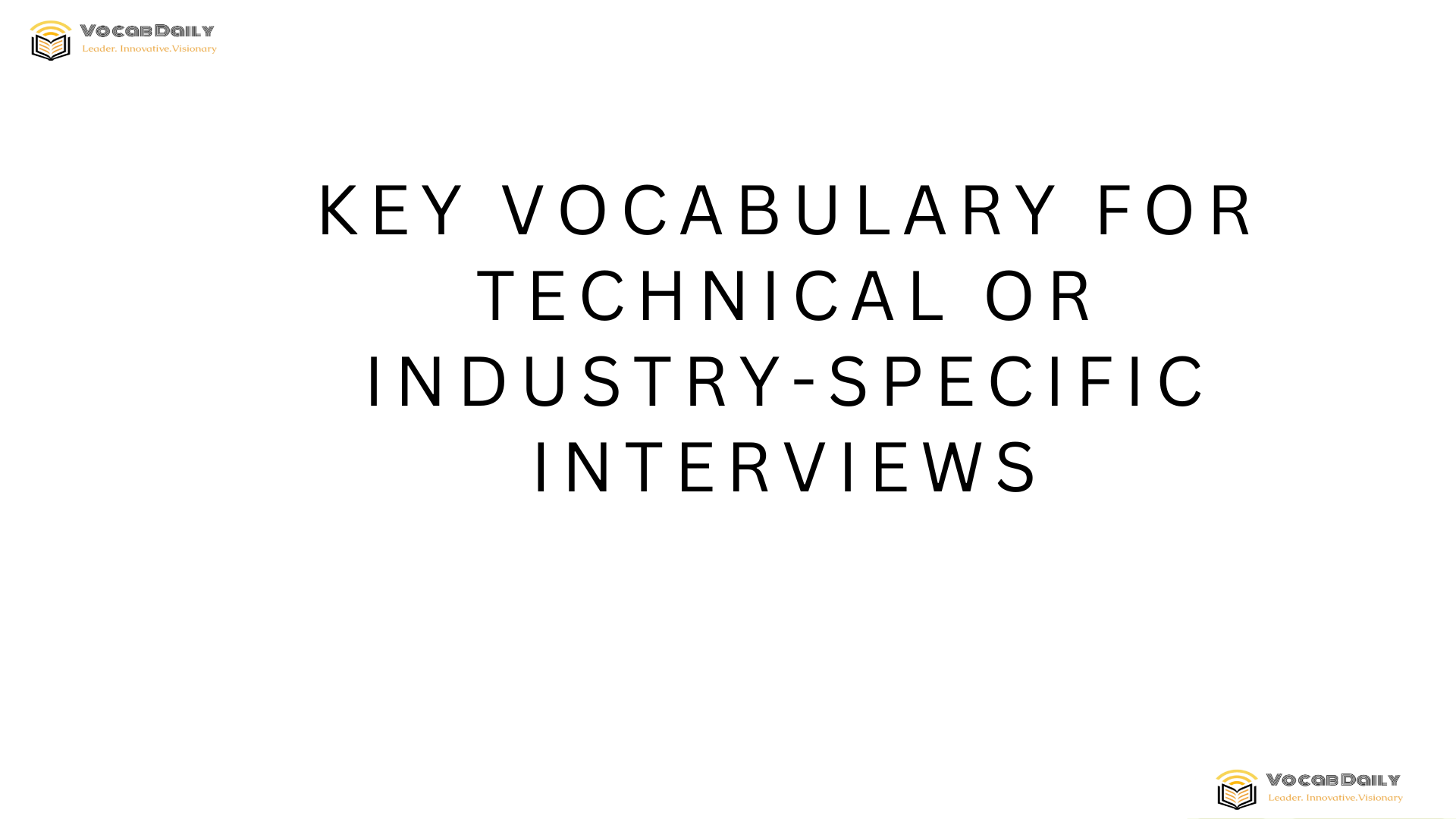Key Vocabulary for Technical or Industry-Specific Interviews
Preparing for a technical or industry-specific interview requires more than just understanding your field; it also demands a good command of the vocabulary commonly used in these environments. Whether you are interviewing for a position in IT, engineering, healthcare, finance, or any specialized sector, knowing the right terms can set you apart as a knowledgeable and confident candidate.
Understanding Industry Jargon
Industry jargon is the specialized language used within a particular field. Using this language correctly shows your familiarity with the subject matter and helps you communicate more effectively with interviewers. For example, in software development, terms such as “API,” “framework,” and “debugging” are common. In healthcare, you might encounter “patient compliance,” “clinical trials,” or “diagnostic imaging.”
Familiarizing yourself with the jargon relevant to your field gives you an edge during interviews because it reflects your hands-on experience and understanding. However, be careful to use these terms appropriately and clearly so that even non-technical interviewers understand your points.
Core Technical Terms for IT Interviews
IT and software development interviews often focus on technical concepts alongside your problem-solving skills. Some key vocabulary to master includes:
- Algorithm: A set of instructions designed to perform a task.
- Data structure: Methods of organizing and storing data such as arrays, linked lists, and trees.
- Backend: The server-side logic and database management of a website or application.
- Frontend: The user interface, or what users see and interact with.
- Cloud computing: Delivery of computing services over the internet.
- Debugging: The process of identifying and fixing errors in software.
Using these terms naturally during your responses demonstrates your technical competence and helps interviewers see that you are well-versed with the daily responsibilities of the role.
Engineering Interview Vocabulary
Engineering interviews typically assess your technical knowledge, problem-solving ability, and understanding of complex concepts. Important vocabulary terms might include:
- Load-bearing: The ability of a structure to support weight.
- Stress analysis: The study of how forces affect materials and structures.
- CAD (Computer-Aided Design): Software used for creating precise drawings and models.
- Prototype: An early sample or model built to test a concept or process.
- Compliance: Adherence to engineering standards, laws, and regulations.
- Thermodynamics: The branch of physics dealing with heat and temperature.
Understanding and using these terms during an interview indicates that you possess the essential technical knowledge required for the job.
Healthcare Industry Terms for Interviews
Healthcare professionals need to communicate clearly about complex medical concepts and patient care. Using the correct terminology during an interview reflects professionalism and accuracy. Key vocabulary includes:
- Diagnosis: Identification of a disease or condition based on symptoms and tests.
- Patient compliance: The degree to which a patient correctly follows medical advice.
- Clinical trial: Research studies that test new medical treatments or drugs.
- Medical history: A record of past health problems and treatments.
- Prognosis: A prediction of how a disease will progress.
- Emergency response: Procedures followed during urgent medical situations.
Mastering such vocabulary not only aids in conveying your knowledge but also reassures interviewers of your competency in patient care and medical procedures.
Finance and Accounting Vocabulary
In finance and accounting interviews, familiarity with industry terms is crucial. Employers look for candidates who understand the financial concepts and can discuss them clearly. Some key terms include:
- Balance sheet: A financial statement that shows assets, liabilities, and equity.
- Cash flow: The movement of money in and out of a business.
- Depreciation: The reduction in the value of an asset over time.
- Audit: An official examination of financial accounts.
- Fiscal year: A 12-month period used for budgeting and financial reporting.
- Risk management: Identifying and minimizing financial risks.
Using these words correctly signals to your interviewer that you are comfortable discussing complex financial data and procedures.
Tips for Learning and Using Industry-Specific Vocabulary
Memorizing vocabulary lists is only part of the process. Here are some strategies to help you learn and apply industry-specific terms effectively:
- Contextual Learning: Use industry articles, manuals, and videos to see how terms are used in real situations.
- Practice Speaking: Incorporate new words into mock interviews or conversations with mentors or peers.
- Flashcards: Create flashcards with definitions and example sentences to test yourself regularly.
- Write Responses: Draft answers to common interview questions using key vocabulary to build familiarity.
- Stay Updated: Industries evolve, so keep learning new terms that reflect current trends and technologies.
Consistent practice will increase your confidence and help you demonstrate professionalism during interviews.
Common Interview Questions Using Technical Vocabulary
To better prepare, familiarize yourself with interview questions that encourage the use of industry jargon. Examples include:
- Can you explain a challenging project where you had to apply your knowledge of [field-specific concept]?
- How do you approach [technical task or problem] in your work?
- Describe a time you utilized [industry software or system] to improve efficiency.
- What strategies do you use to ensure compliance with [industry regulations or standards]?
- How do you stay updated with the latest advancements in your field?
Answering questions like these with the right vocabulary not only makes your responses clearer but also reflects your engagement and expertise.
Building Confidence with Key Industry Terms
Confidence comes from understanding and practicing. As you learn the key vocabulary of your field, integrate them naturally into your speech. Try recording your answers and listening back to check for clarity and tone. If possible, get feedback from professionals in your industry.
Showing mastery of technical terms without sounding rehearsed or robotic is crucial. Focus on clear explanations, and when necessary, use examples to illustrate your points. Remember, communication is about sharing information effectively, not just using complicated words.
By blending your industry knowledge with appropriate vocabulary, your interviewers will recognize your preparedness and suitability for the role.
Also check out VocabDaily workbook collections.

Leave a Reply